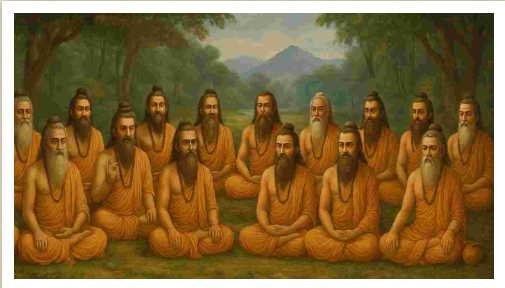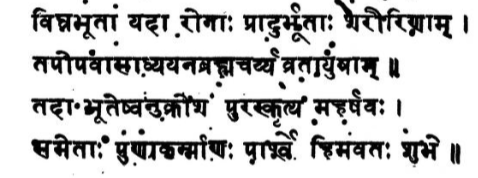Caraka Saṃhitā: Verses 1.1.14-17
ब्रह्मज्ञानस्य निधयो दमस्य नियमस्य च ।
तपसस्तेजसा दीप्ता हूयमाना इवाग्नयः ॥ C१,१.१४
सुखोपविष्टास्ते तत्र पुण्यां चक्रुः कथामिमाम्
।
धर्मार्थकाममोक्षाणामारोग्यं मूलम् उत्तमम् ॥ C१,१.१५
रोगास्तस्यापहर्तारः श्रेयसो जीवितस्य च ।
प्रादुर्भूतो मनुष्याणामन्तरायो महान् अयम् ॥ C१,१.१६
कः स्यात्तेषां शमोपाय इत्युक्त्वा ध्यानमास्थिताः
। C१,१.१७ a,b)
Oceans of the knowledge of Brahma, of restraint, and of
observances, blazing with the energy of ascetic penances, (and) like fires upon
which have been poured libations of clarified butter, these, seated there at
their ease, took part in this beneficial conversation, (saying), — “Freedom
from disease is the excellent root of Religion, Profit, Pleasure, and
Salvation. Diseases are depredators thereof as also of happy life. This
(therefore) is a great enemy of men that hath appeared. What shall be the means
of checking them?’’ — Having said this, they betook to meditation
brahmajñānasya – of the knowledge of Brahma (neuter,
genitive, singular)
nidhayaḥ
- store houses, treasures (masculine, nominative, plural)
damasya – of control, of self command (masculine, genitive,
singular)
niyamasya – of restraint (masculine, genitive, singular)
ca – and (indeclinable)
tapasas+tejasā – with the brilliance of austerity (neuter, instrumental,
singular)
dīptāḥ - blazing, brilliant (adjective, masculine,
nominative, plural)
hūyamānāḥ
-being, sacrificed into [with ghee?] (passive present participle, masculine, nominative, plural)
iva – like (indeclinable)
agnayaḥ - fires (masculine, nominative, plural)
sukhopaviṣṭāḥ (sukha+upaviṣṭāḥ) seated comfortably (adjective,
masculine, nominative, plural)
te – they (pronoun,
masculine, nominative, plural)
tatra – there (indeclinable)
puṇyāṃ - auspicious, righteous
(adjective, feminine, accusative, singular)
cakruḥ
- undertook, accomplished (3rd person, perfect, plural √ कृ kṛ)
kathām – talk, discussion, story (noun, feminine, accusative,
singular)
imām – this (pronoun, iyam, feminine, accusative, singular)
dharmārthakāmamokṣāṇām
of dharma, artha, kāma, and mokṣa (dvandva, masculine, genitive, plural)
ārogyaṃ - lack of/freedom from disease (noun, neuter,
nominative, singular)
mūlam – root (noun, neuter, nominative, singular)
uttamam – best, highest (adjective, neuter, nominative,
singular)
rogāḥ - diseases (noun, masculine, nominative,
plural)
tasya – of that (tat, pronoun, neuter, genitive, singular)
apahartāraḥ
- remover, plunderer (apa+hartḥ,
agentive noun, masculine, nominative, plural)
śreyasaḥ
- of the best (adjective, neuter, genitive, singular)
jīvitasya – of life (neuter, genitive, singular)
ca – and (indeclinable)
prādurbhūtaḥ
- appeared, manifested (masculine, nominative, singular)
manuṣyāṇām
– of men (masculine, genitive, plural)
antarāyaḥ - obstacle (noun, masculine, nominative,
singular)
mahān – great (adjective, masculine, nominative, singular)
ayam – this (pronoun, (masculine, nominative, singular)
kaḥ -
what, who (interrogative pronoun, masculine, nominative, singular)
syāt – shall be (verb, optative, 3rd person, singular)
teṣāṃ -
of them (pronoun, masculine, genitive, plural)
śamopāya – [śama+upāya] solution for pacifying, subduing
iti – speech marker, indeclinable
uktvā – having said this (gerund, indeclinable, √vac)
dhyānam – meditation, concentration (neuter, accusative,
singular)
āsthitāḥ -
remained, settled in meditation (masculine, nominative, plural, passive past
participle, ā√ sthā)










